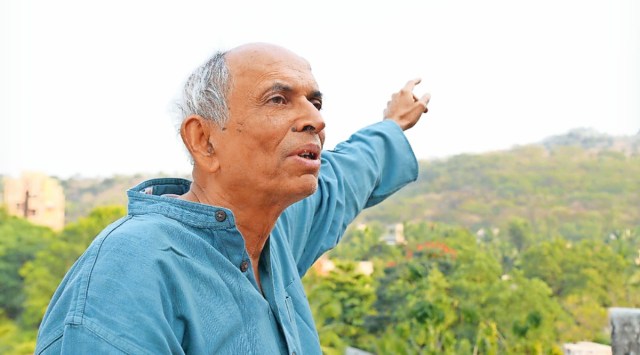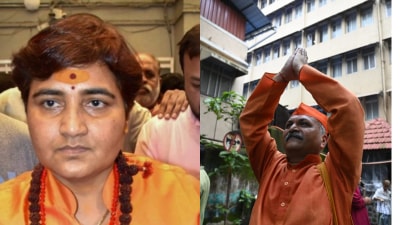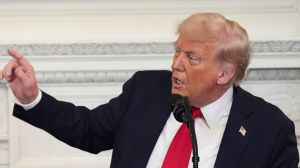We knew our report on Western Ghats would be unpalatable to those in power, says Dr Madhav Gadgil
In an interview to Mohamed Thaver on his report, Dr Madhav Gadgil spoke to about why he was sceptical about the claims made by the state government in the house.
 Dr Madhav Gadgil
Dr Madhav Gadgil After the Irshalwadi landslide incident in Raigad, the Opposition asked the Maharashtra government why the Dr Madhav Gadgil Committee report on Western Ghats had not been implemented. In an interview to Mohamed Thaver on his report, Dr Madhav Gadgil spoke to about why he was sceptical about the claims made by the state government in the house.
Is it frustrating that after every natural calamity, implementation of your report is spoken about before it is conveniently forgotten?
No, it is not frustrating at all… I knew that our report will not be to the liking of those in power and those with money. We had been very forthright in our report, based on objective evidence we collected. We knew it would be unpalatable to those in control of affairs. I had an inkling that there won’t be any action on our report.
In Mahabaleshwar, when I interacted with local people, they told me that if they wanted to dig another well, the bureaucracy would not give permission citing depletion of groundwater level. However, if they paid Rs 20,000, they would get the permission. This is just one example of the many instances of misbehaviour of bureaucracy and politicians.
To ensure transparency, the report suggested ways to enable local people to track what was going on environmentally. The Constitution, too, allows it as there are many acts empowering people to make basic decisions about development and conservation of nature.
So, I knew it will be opposed tooth and nail. But I was clear I am preparing this report not for any particular administration but for the citizens of India to inform them what was going on.
After the Irshalwadi incident, when asked about the implementation of your report, Deputy Chief Minister Devendra Fadnavis said in the House that as per the report’s recommendation, mapping of all the landslide-prone villages in the state was done and that Irshalwadi was not on it.
It is absurd. We never asked for that. He said they had gone and mapped all villages in terms of buffer zones and core zones. I didn’t understand what the statement meant and I asked a number of people if they understood what he was saying as the report doesn’t mention any of it.
I have friends in the Western Ghats who haven’t heard of any such thing. All the evidences that I have gathered in the past two days since the statement, show that no survey (on the lines of what we had mentioned in the report) has taken place and I am quite sure that it has not taken place.
What has been the reaction of various governments ever since the report was submitted in 2011?
The governments initially said the report was against national security. I requested that the report should not be restricted to English and be translated to all Western Ghat languages such as Konkani, Malayalam, etc., which they did not do.
#Tragic#
Land-slide in Irsalwadi,Teh-Khalapur Raigad (MH) caused havoc. Approx 15-20 houses buried. NDRF on-site for rescue. Praying for survivors. #RaigadLandslide 🙏@ANI @sdmamaharashtra
@ndma @NDRFHq @PIBMumbai pic.twitter.com/qiExSmKH1L— 5 NDRF PUNE (@5Ndrf) July 20, 2023
When the Maharashtra government was forced to release the report in 2012, they uploaded a Marathi summary on their website in such a way that people got a completely wrong picture that our report was full of restrictions. It said that if our report was implemented, they will suffer.
A powerful Maharashtra politician put up banners in Sindhudurg that if the report was accepted, people will get into their houses then seize plastic chairs and objects.
Over the years, due to climate change, have things gotten worse in terms of natural calamities like landslides?
As per a study conducted by geologist Himanshu Kulkarni on landslides, over the past 10–15 years there has been a 100-fold rise in landslides — both big and small which may not necessarily cause human casualties — in the Western Ghats region in Maharashtra.
There have been settlements on hills since the times of Shivaji Maharaj. I have read historical documents and there is no mention of landslides then. So why has it suddenly become vulnerable? It is because of improper interferences in nature.
You are coming up with a new book next month about your journey.
Yes, the 546-page report is technical and difficult for people to digest. I have written a smaller readable book ‘A Walk Up the Hill’, which not only talks about the report but provides background information and subsequent developments.
You have said that you learned to identify birds before you learned to read and that it was a gift from your father.
My father Dhananjaya Gadgil, an economist who later went on to become the Deputy Chairman of the Planning Commission, was fond of trekking in the Western Ghats and would take me along since an early age. Now children learn to read by the time they are three years old. I was lucky my parents allowed me to wander the open countryside with my father showing me the natural world. I was identifying birds looking at pictures before I learnt to read.












